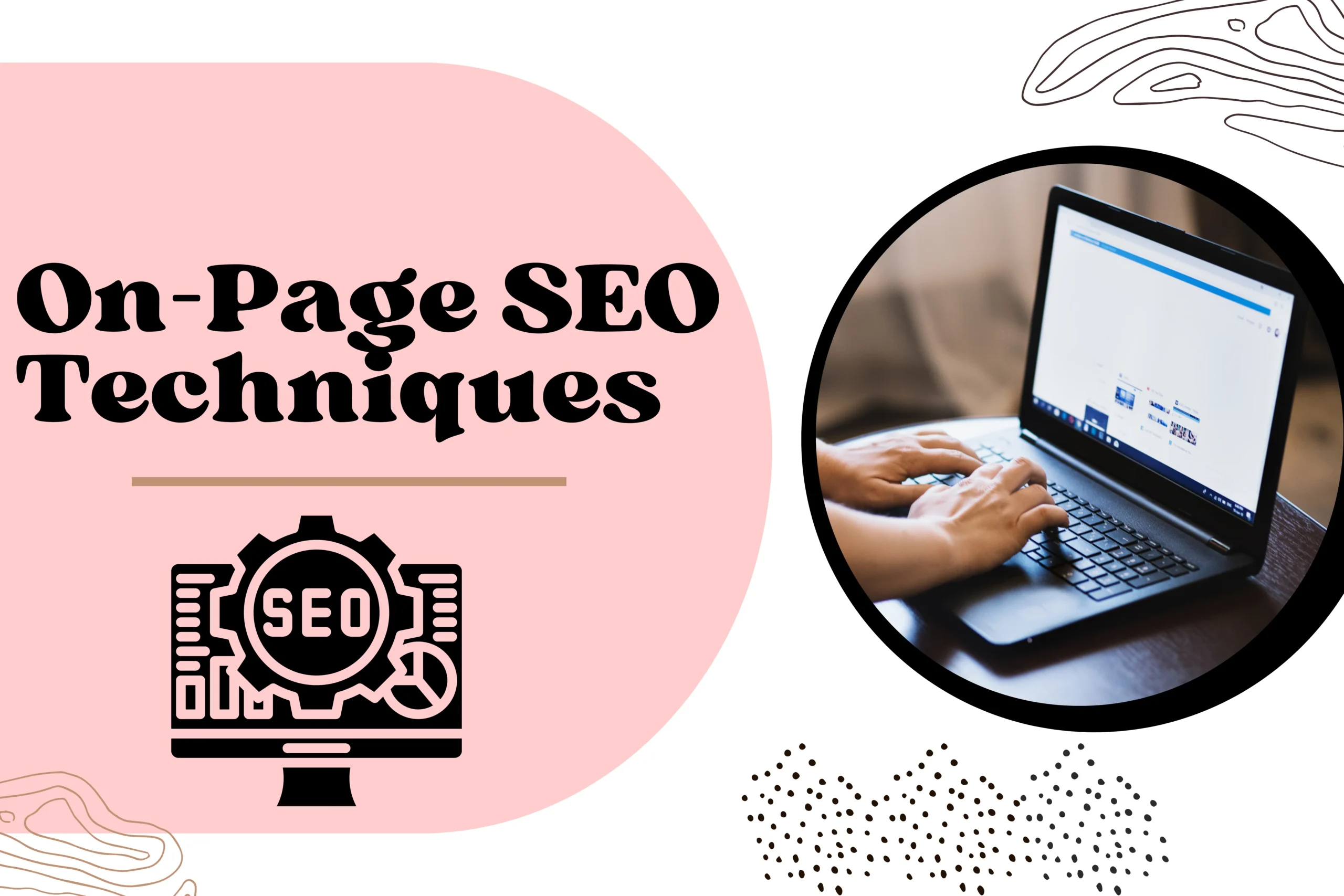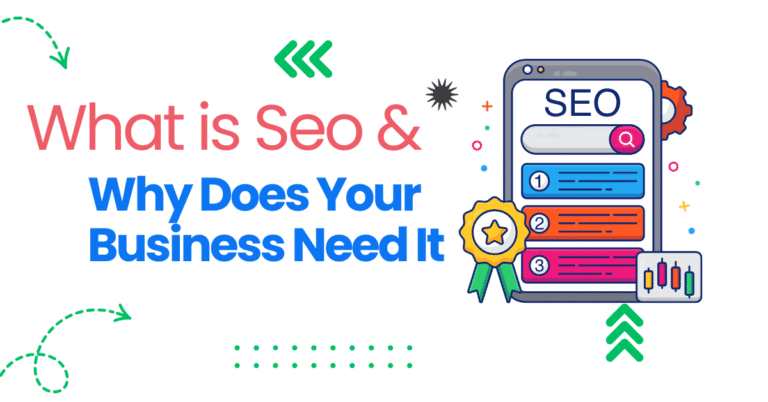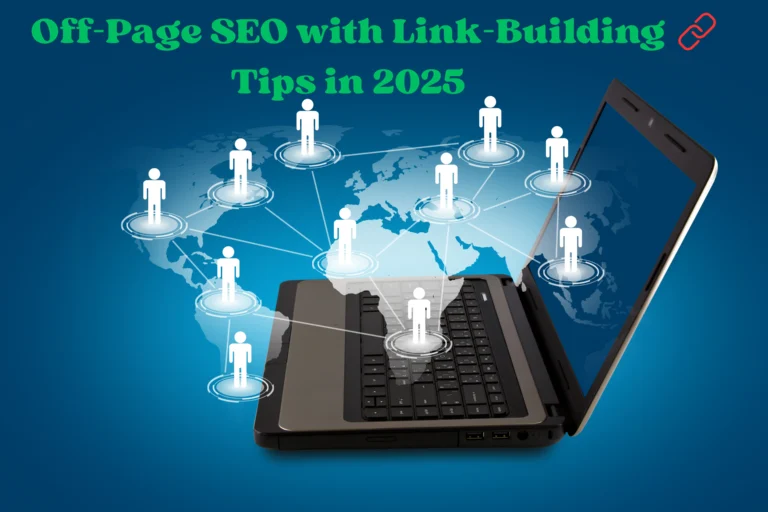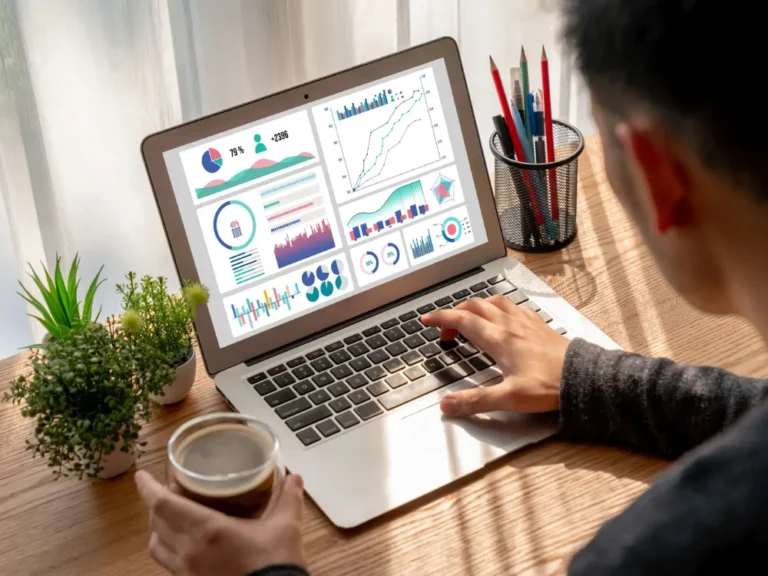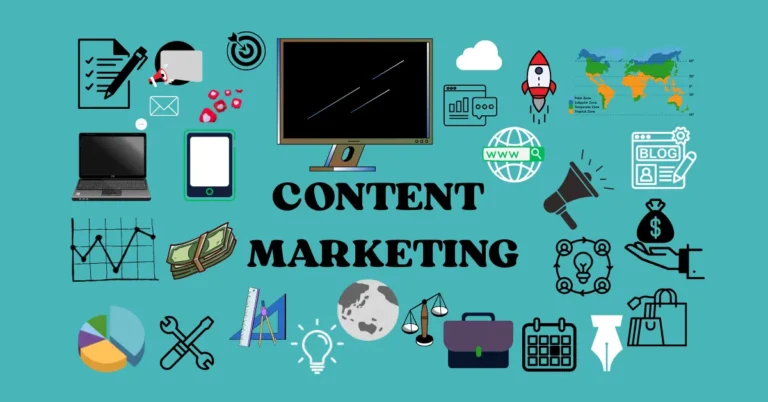In 2025, traditional SEO methods will no longer suffice. However, it’s time to customize your strategy; you’re still stuffing keywords or chasing old tricks. Why? Google’s algorithms are now powered by advanced AI and machine learning, which means they can truly understand search intent, natural language, and the environment behind your content, not just keywords.
One major shift is the rise of Google’s search Generative Experience (SGE), which delivers AI-generated answers directly on the search results page. So now, to rank, your content needs to be clear and very helpful.
That’s where on-page SEO appears. In simple terms, on-page SEO refers to the changes you make on your website to help it boost ( like optimizing headlines, content, URLs, and internal links).
In this blog, you’ll learn the most effective On-Page SEO Techniques to Boost Rankings in 2025. Whether you’re a blogger, marketer, or business proprietor, this companion will help you write content that both Google and your callers will love. Ready to future-evidence your SEO?
What is On-Page SEO?
Consider your website as a physical store. On-page SEO is like drawing the shop, arranging the shelves, identifying the products, and putting up signs, all before a client walks in. However, confusing or inadequately lit, if your store is messy. The same goes for your website.
On-page SEO refers to the method of optimizing single web pages to help them rank advanced on search engines like Google. This includes effects like your content, meta markers, URLs, headlines, images, and internal links.
This is how it varies from the others.
- On-Page SEO: Everything you control on your page ( content, structure, keywords).
- Off-Page SEO: Conditioning outside your point ( like backlinks and social shares, content, and marketing your site).
- Technical SEO: Backend advancements(page speed, mobile benevolence, crawlability).
All three work together, but on-page SEO is your foundation. It’s where SEO starts, and without it, everything additional struggles to work.
In the coming section, we’ll explore why On-Page SEO is indeed more important in 2025 than ever ahead.
Why On-Page SEO Matters in 2025
Search has changed. In 2025, simply adding keywords to a page isn’t enough. With the rise of Google’s Search Generative Experience( SGE), search machines now understand the environment, not just content. This means your pages must be acclimatized for user intent, not keyword tricks.
On-Page SEO has become more important than ever because search results are now energetic, AI-generated, and concentrated on answering questions directly. So if your content is well-structured, helpful, and engaging, you won’t get visibility, no matter how many backlinks you have.
Here’s the key: User experience( UX) and intent matter more than stuffing keywords. If your page answers the searcher’s question, loads fast, and keeps people engaged, Google notices. And rewards you.
Recent Google Core Updates have systematically de-ranked low-quality, thin, or Old content. Many sites lost traffic because they failed to enhance their On-Page SEO practices. Pages that demanded internal linking, had poor formatting, or missed helpful headlines got buried.
In discrepancy, websites that concentrated on applicable content, page layouts, and good UX saw better rankings and conversions. When you come into view in the search results, you are not just getting clicks and impressions, you’re earning trust.
That’s why learning On-Page SEO in 2025 is not optional; it’s essential for visibility, authority, and growth Strategy. Before you write a single word of content, you need to know what people are searching for, and that’s where keyword exploration comes in. For example: “best pizza fast food service in the USA”.
In 2025, picking out the right keywords is not just about business. It’s about identifying the right business that converts.
Utilize tools like Ahrefs, SEMrush, and Google Keyword Planner. You can find words your viewers type into Google. These tools help you assess search volume, keyword difficulty (KD), and search intention.
Focus on a blend of short-tail keywords( broad terms like “ SEO ”) and long-tail keywords( specific expressions like “ how to do on-page SEO in 2025 ”). Long-tail keywords are easier to rank for and frequently bring in more good business.
Don’t stop at exact matches. Utilize LSI or semantic keywords, which are contextually related terms that help search engines understand your content more.
When placing keywords, use them naturally in
- Title label
- URL
- First 100 words
- Headlines( H2/ H3)
- Alt textbook for images
- Meta description
- Throughout the content( but avoid keyword filling)
In short, great content starts with smart keyword exploration. It’s not about ranking for everything, it’s about ranking for what matters.
On-Page SEO Strategies to Boost Ranking in 2025
- Title tag Optimization
Your title label is one of the first effects both the user and search machines notice. Keep it between 45 – 60 characters, make it applicable, and include your primary keyword near the beginning. For example, “ Top On-Page SEO ways for 2025 ” is clear and optimized. Avoid general titles or stuffing multiple keywords. Utilize instruments like Yoast SEO or Rank Math to see how your title will be relevant in search results.
- Meta Description Writing
A compelling meta description improves click-through rates. Keep it under 160 characters, use your target keyword naturally, and concentrate on working on the stoner’s problem. Add an emotional detector or a CTA like “ Learn more ” or “ Boost your business moment. ” illustration: Learn 10 important on-page SEO tips that work in 2025. Ameliorate your business and rankings at once. ” Use it as your elevator pitch for Google search.
- Using Title Tags ( H1 – H3)
Duly ordered headings help both the reader and Google overlook your content. H1 for the main and important heading because Google starts indexing the title of the article, then H2 for the subheading, and secondly, focus on the H2 heading. And h3 is the last important heading to use many times in our articles. Break content into reasonable gobbets and make sure each section answers a specific question, and clear all queries. Heads should involve semantic keywords when possible. Avoid stereotyping H1 or skipping situations, and keep the scale clean and reasonable.
- Content Quality and Keyword Placement
Your writing must be written for humans, not AI-generated. Use a natural tone, helpful perceptivity, and bold semantic keywords to punctuate applicability. Place your main keyword in the starting paragraph, headlines, and throughout the body, and keep away from keyword stuffing. Utilizes simple language, short paragraphs, and good readability. Write like you are working on a real person’s problem.
- Image Optimization
Images help people attract, but they must be optimized. Always use descriptive document names, add alt text with applicable keywords, and compress your images utilizing tools like TinyPNG or ShortPixel. Also, enables lazy loading to ameliorate runner speed, especially on mobile. This helps your point cargo briskly and provides a better stoner experience.
- Internal Linking
Linking to other applicable runners within your point improves navigation and reduces bounce rate. Use a clear anchor textbook ( e.g., “ learn specialized SEO ”) rather than general expressions like “ click then. ” Link to high-performing runners to boost their authority and help druggies explore affiliated content. Tools like Screaming Frog can help you review your internal links.
- Clean URLs and Slugs
A well-structured URL should be short, striking, and include your main keyword. For example, use /best-expensive-cars/post?td=1234345. Don’t use any figures and symbols to stop words. Stick to lowercase letters and punctuation for better readability and SEO. Neat and clean URLs are more shareable and memorable.
- Schema Markup and Structured Data
Schema markup helps search engines understand your written content types. Adding structured data better the chances of coming up with a view with rich snippets in SERPs. Utilize tools like Google’s Rich Results Test or TechnicalSEO.com Schema Generator to implement it properly.
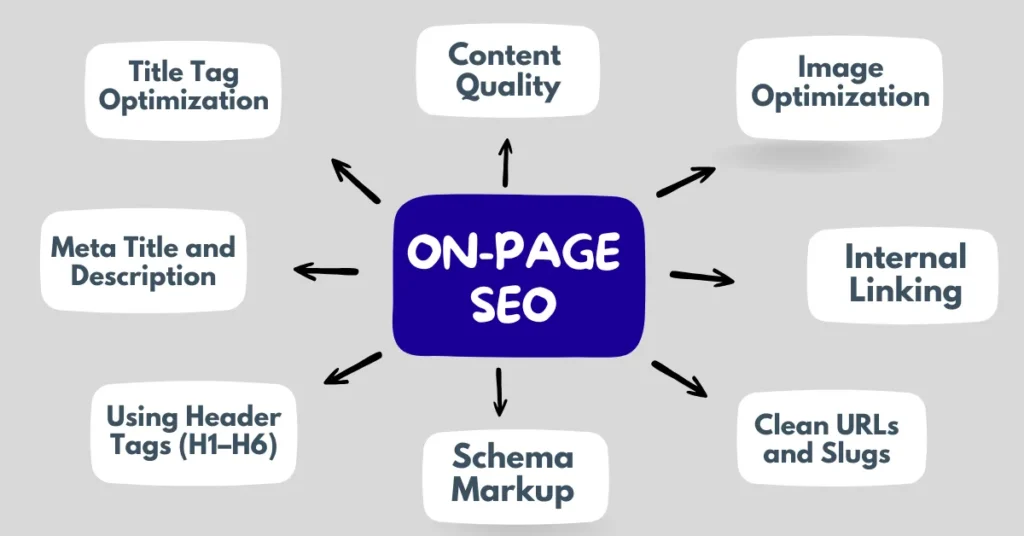
Tools You Should Use for On-Page SEO
Having the right tools can make on-page SEO brisk, easier, and far more effective.
Here are some of the methods and techniques in 2025
- Yoast SEO: Perfect for WordPress users, they support and help all the time( like optimizing titles, meta descriptions, and better readability).
- Rank Math: A powerful Yoast replacement, Rank Math offers advanced schema boost, keyword tracing, and Google Search Console integration.
- Surfer SEO: Great for writers because it analyzes top-ranking pages and gives data-driven guidelines on word count, keyword density ( KD), and structure.
- Screaming Frog: A scientific instrument to audit your site for split links, missing meta tags, and crawl issues.
Real Case Study: How On-Page SEO Tripled Traffic
In mid-2024, a small particular finance blog was floundering to gain traction. Despite publishing good content, they were stuck at 2,000 yearly callers. With no budget for backlinks, they decided to go with on-page SEO, and it paid off.
Then’s what they did:
- Keyword Optimization: They streamlined posts with long-tail keywords and added LSI terms using Surfer SEO.
- Title & Meta Rewrites: Each blog post got a fresh, clickable title label and meta description using Yoast SEO.
- Header Structure Fixes: All posts were reorganized with proper H1–H3 markers for readability and semantic clarity.
- Internal Linking: They added links between affiliated posts, perfecting bottleneck depth and stoner inflow.
- Image & URL Optimization: Old images were compressed and converted webp, renamed, and tagged; messy URLs were gutted.
Within 4 months, their business jumped from 2,000 to 6,500 callers a month, a 3x increase, without a single backlink added.
This proves that with the right on-page SEO plans, indeed, small blogs can contend and grow organically in 2025.
Common On-Page SEO Miscalculations to Avoid
Indeed, in 2025, many websites make simple on-page SEO miscalculations that hurt their rankings. Let’s look at many things you should avoid at all costs.
- Keyword Stuffing
Repeating the same keyword too many times makes your content look unnatural. Search machines are smart enough now to catch this and may correct your page. Rather, use semantic keywords and write in a way that feels natural to humans.
- Ignoring Mobile-Friendliness
Over 60 percent of people browse on mobile. However, you’ll lose both rankings and druggiesIf if your point isn’t mobile-optimized. Use Google’s Mobile-Friendly Test to check your point.
- Duplicate Meta Descriptions
Using the same meta description across multiple pages confuses Google and weakens your CTR. Each page should have a unique, keyword-rich summary.
- Not streamlining Old Content.
Google favors fresh, streamlined content. Leaving outdated papers untouched can lead to ranking drops. Regularly inspect and update old posts and internal links.
Keeping away from these ordinary dangers can make your on-page SEO plan far more effective.
Conclusion:
In 2025, learning on-page SEO isn’t voluntary; it’s the foundation of every successful website. With Google’s AI-driven hunt systems and frequent algorithm updates, your capability to rank depends further than ever on how well your pages are structured, optimized, and written for real people.
From writing compelling title markers and meta descriptions to optimizing content, images, and URLs, each small change plays an important part in perfecting your visibility. Flashback, it’s not about tricking hunt machines presently; it’s about authentically helping druggies and giving them a smooth, applicable, and fast experience.
Still, you now have the tools to take action if you’ve read this far. Start enforcing these on-page SEO steps step by step and watch your rankings and transformations grow.
Need expert help? At Boost Zonic, we specialize in creating SEO-optimized websites and blog strategies that perform in the moment’s competitive digital world. Whether you need a one-time inspection or a full-scale SEO operation, we’re here to support your growth.
Don’t stay. Let your content be set up and trusted. Reach out to Boost Zonic moment.

